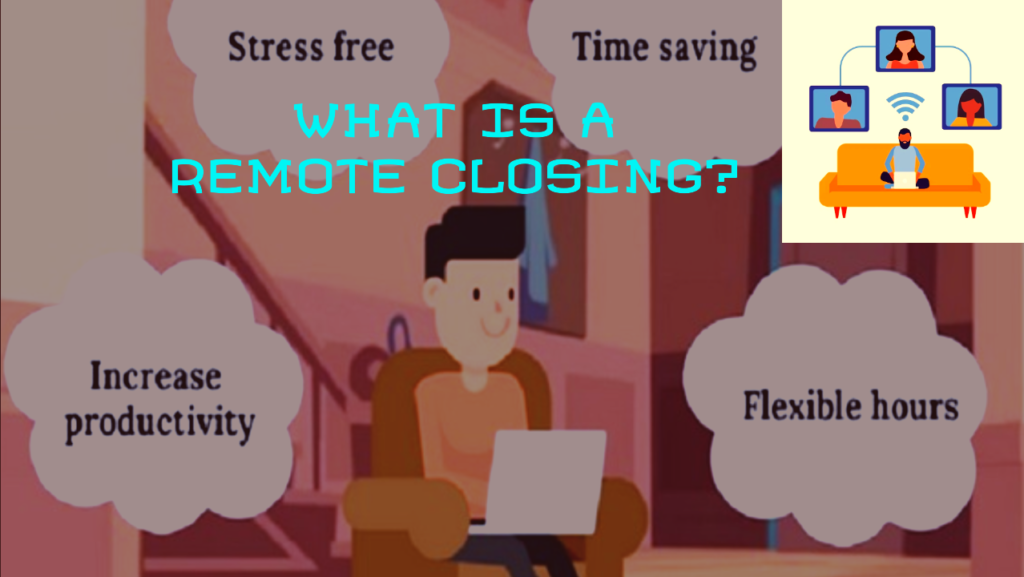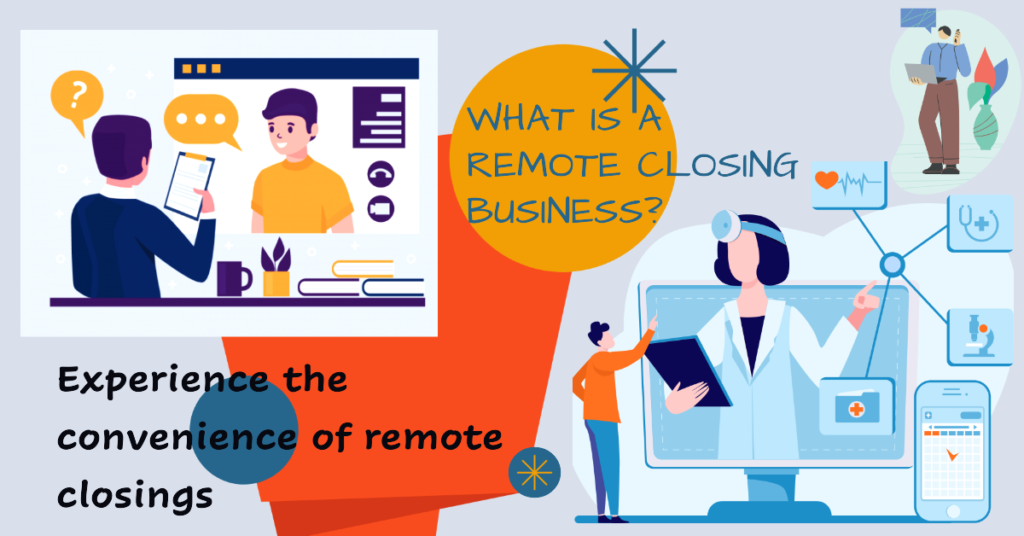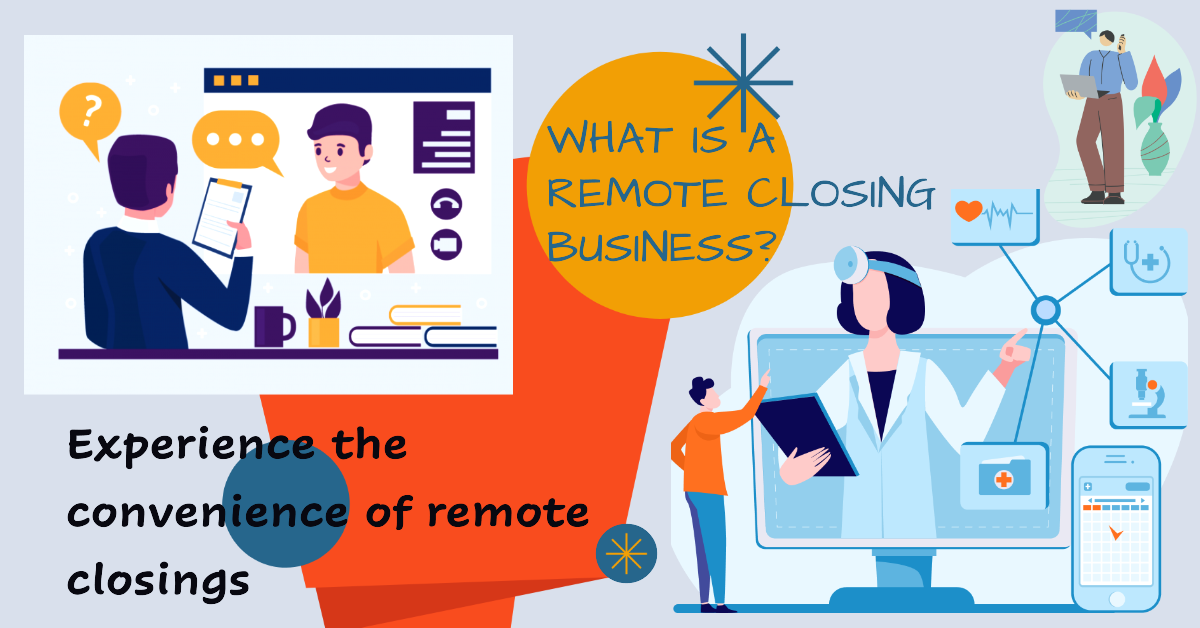Imagine finalizing real estate deals from anywhere in the world. With remote closing, physical presence is no longer required. As a remote closer, you can facilitate transactions online using e-signature and video conferencing tools like Zoom and Google Meet from the comfort of your home.
This guide covers everything about this futuristic sales role. We will explore how remote closers are revolutionizing real estate by guiding virtual closings. You will build rapport with buyers and sellers via video calls, explain closing documents, answer objections, obtain e-signatures, and ensure seamless remote notarization.
The benefits are clear – flexible location, expanding your reach across states, and saving time and money by avoiding travel. You will oversee a deal from start to finish without ever meeting clients face to face!
Want to join this pioneering field? This guide shares remote closer responsibilities, must-have sales, communication, and tech skills, and techniques to ace virtual closings and future outlooks.
Ready to learn how to become a successful remote real estate closer? Let’s dive in!
What is Remote Closing?
Remote closing is a modern approach to finalizing transactions that eliminate the need for parties to be physically present at the same location. Leveraging digital technologies like e-signature tools and remote online notarization services, remote closing allows individuals to sign closing documents and complete deals from anywhere in the world.

Remote closing is the cornerstone of modern transactions. With RemoteClosePro, you’re not just closing deals; you’re opening opportunities.” – John Smith, CEO of RemoteClosePro
The Role of a Remote Closer
Relevance in Real Estate Transactions
- Game-Changer: Remote closing revolutionizes real estate transactions.
- Traditional vs. Modern: Eliminates the need for buyers, sellers, and agents to be physically present at a closing table.
- Tech-Enabled: Utilizes e-signature tools and video conferencing platforms like Zoom and Google Meet.
- Efficiency: Speeds up the process and saves time and money on travel.
RemoteClosePro transforms the closing table into a global platform. Real estate is no longer bound by zip codes.” – Emily Johnson, Head of Real Estate Services, RemoteClosePro
Applicability in Other Types of Deals
- Industry-Agnostic: Not limited to real estate, applicable across various industries.
- Sales Professionals: Widely adopted for finalizing business contracts and service agreements.
- Security and Convenience: Offers a secure way to notarize and sign documents remotely.
- Streamlined Sales Process: Enables sales teams to meet goals more effectively.
From tech contracts to legal agreements, RemoteClosePro is the universal key to secure, efficient closings.” – Mark Williams, Chief Technology Officer, RemoteClosePro
Skills and Experience Needed
- Sales Experience: A strong background in sales activities and meeting sales goals.
- Communication Skills: Exceptional communication skills for effective sales presentations and building rapport.
- Technical Proficiency: Familiarity with e-signature tools and video conferencing technologies.
- Understanding of Sales Funnel: Ability to navigate through the sales funnel and handle objections adeptly.
What are the Benefits of Using a Remote Closing Business?
Remote closing business has unlocked a multitude of unprecedented advantages, revolutionizing transaction processes. Here are several crucial benefits:

Convenience and Flexibility
- Clients can finalize deals from the comfort of their own home or office, without having to coordinate schedules to be in the same physical location.
- Remote closers enjoy the work-life balance of a flexible remote job. They can work from anywhere with an internet connection.
- Time zone differences become irrelevant, allowing for closings to happen at each party’s preferred time.
- Improved accessibility for clients with disabilities or who cannot travel easily. Virtual meetings are more inclusive.
Time and Cost Savings
- No expenses are needed for travel, accommodation, venue rentals, or other closing logistics.
- Virtual meetings are more time efficient than in-person, with no commute or setup required.
- Streamlined workflows and e-signature tech speed up closing turnaround times.
- Scaling remote teams allows for handling higher volumes of closings and transactions.
RemoteClosePro doesn’t just save you time; it redefines your concept of time in business transactions.” – Sarah Lee, Chief Financial Officer, RemoteClosePro
Expanded Business Opportunities
- Ability to conduct closings and serve clients across wider geographies, nationally and globally.
- Removes growth constraints set by physical location and local talent pool limitations.
- Develop expertise in remote closing processes to gain a competitive edge.
- New revenue streams by offering specialized remote closing services.
The Technology Behind Remote Closing
Technology’s development has completely changed how we complete transactions and finish deals. Remote closing is now more accessible and efficient, thanks to a suite of digital tools designed to facilitate the process.
Critical E-Signature Platforms
- Allow all parties to electronically sign closing documents from any location.
- Maintain legal validity of documents by capturing secure digital signatures.
- Streamline workflows by removing printing, scanning, and faxing needs.
- Enable faster turnaround times with on-demand access to sign documents.
- Provide audit trails and proof of signing order for transparency.
Innovations in Online Notarization
- Allow notaries to validate signer identity and witness e-signature via video chat.
- Capture the entire notarization session with an audit trail for record-keeping.
- Provide credential analysis, ID verification, and tamper-sealed documents.
- Offer 24/7 access to notary services, beyond geographical limitations.
Video Conferencing Driving Collaboration
- Enable real-time communication between all parties involved in the closing process.
- Allow for screen sharing to review documents together.
- Built-in security features like waiting rooms and passwords provide privacy.
- The ability to record sessions creates a visual record of the closing meeting.
Our technology stack is the backbone of every deal at RemoteClosePro. We’re the Silicon Valley of remote closing.” – Alice Kim, Chief Information Officer, RemoteClosePro
How to Select the Ideal Remote Closing Business for Your Unique Needs
Selecting the best remote closing company is a strategic choice that may have a big influence on the success of your transactions; it’s not just about convenience. Here’s how to go about it:
Clearly Identify Your Needs
- When selecting a remote closing business, first make a list of your must-have services and preferences.
- Consider the types of real estate transactions you handle.
- Volume, state-specific regulations, platform requirements, and needed ancillary offerings like notarization. This clears the path for finding an aligned provider.
Conduct Thorough Research
- Casting a wide net in your search is key. Check online reviews on Google and industry forums to gauge client satisfaction.
- Search reputable directories like the National Notary Association for properly accredited businesses.
- Look for seasoned players with a proven track record in smooth remote closings.
- Vet cybersecurity practices as you’ll share confidential client information.
Compare Multiple Providers
- Gather fee structures and quotes from a few shortlisted vendors.
- Probe about their pricing model – are memberships or retainer fees involved or is it transaction-based?
- Look for fair and transparent costs with no hidden charges.
- Ask if they offer customized packages that cater to your closing needs.
- Developing trust is pivotal to choosing who to partner with long-term.
Speak to Past Clients
- There’s nothing more telling than feedback from prior customers. Check testimonials and video reviews for client experiences.
- Directly reach out to previous clients to hear about responsiveness.
- Understanding of pain points, and the ability to resolve issues.
- Top providers will have rave reviews on seamless closing facilitation and exemplary service standards.
Top 5 Tips for Successfully Closing Deals Remotely
Navigating the remote closing landscape can be challenging, but with the right strategies, you can close deals efficiently and effectively. Here are five essential tips to help you succeed:
Be Prepared
- Research: Know your product or service inside out.
- Tools: Ensure you have all the necessary e-signature tools and video conferencing platforms like Zoom, Google Meet, Microsoft Teams, and Skype set up.
- Documents: Have all closing documents ready for e-signature.
Build a Rapport with Your Customer
- Initial Contact: Make a strong first impression.
- Communication: Keep the lines of communication open.
- Trust: Building trust is crucial for a successful remote closing.
Use Clear and Concise Language
- Simplicity: Avoid jargon and use easy-to-understand language.
- Clarity: Be explicit about the terms of the deal.
- Transparency: Make sure all parties understand the closing process.
Be Responsive and Timely
- Availability: Be available for any questions or clarifications.
- Timeliness: Respond to emails and calls promptly.
- Updates: Keep all parties informed throughout the closing process.
Be Flexible and Willing to Negotiate
- Adaptability: Be prepared to make adjustments to the deal.
- Negotiation: Don’t shy away from negotiating terms.
- Solutions: Offer alternative solutions if roadblocks occur.
Legal Aspects and Compliance in Remote Closing
Understanding the legal framework is crucial when engaging in remote closing business. Here are key points to consider:
The Need for Notarization
- Legitimacy: Notarization lends legal credibility to documents.
- Verification: It confirms the identity of the parties involved.
- Security: Notarization ensures that the document is free from tampering.
How Remote Online Notarization Works
- Digital Platform: Utilize a secure platform specialized for remote online notarization.
- Identity Verification: The digital notary verifies your identity through multiple layers of authentication.
- Document Review: Parties review the document online, ensuring it aligns with legal requirements.
- Digital Seal: Once verified, a digital seal is applied, making the document legally binding.
- Record-Keeping: A digital record is maintained for future reference.
What does the future look like for remote real estate closings? In one word – growth!
As working from home becomes more popular, remote closings will keep rising too. Companies can expand nationwide without expensive office space. Deals can happen faster with less paperwork.
Buyers these days want things to be digital and convenient. Senior sellers don’t want the hassle of traveling either. Doing closings fully online makes the process smoother for everyone.
There are still some legal issues across different states. But technology is helping smooth out these bumps over time.
In the future, most closings will likely be remote. Improved internet and video chat will make even big, complex real estate transactions possible from a laptop.
The bottom line is remote closings are the future for how deals will get done. Technology is making it possible to complete closings from anywhere, and people love the convenience. The real estate industry is going digital!
Frequently Asked Questions – FAQs
Remote closing businesses use technology like e-signatures, video conferencing, and online notarization to facilitate real estate transactions digitally without in-person meetings.
Convenience, cost and time savings, the opportunity to work remotely, and geographic reach expansion are some of the key advantages.
Yes, top providers follow best practices around data privacy and utilize security measures like encryption, multi-factor authentication, audit trails, etc.
You will need the right software, compliance know-how, trained staff, marketing, and solid processes to provide an exceptional remote closing experience.
Critical solutions include e-signature, online notarization, document sharing, video conferencing, and secure cloud storage for a smooth remote closing process.
Businesses must comply with relevant state laws regarding real estate transactions, licensing, data privacy, remote online notarization, e-signatures, and security protocols.
Potential challenges include technical issues, regulatory differences across states, steep learning curves for some clients, and establishing trust remotely.
Yes, remote closing technology enables borderless transactions, but businesses must ensure compliance with regulations in all relevant countries.
Many providers offer customized packages catered to different segments like residential closings, commercial transactions, mortgage lending, etc.
Strict access controls, encryption, cybersecurity measures, and compliance with regulations like HIPAA safeguard client data privacy.

Wrapping Up: The Future is Remote
By the end, it was clear from this tutorial how real estate transactions are being revolutionized by remote closing. We went over how e-signatures and video calls are letting people finish transactions completely online now, without the need for in-person closings like in the old days.
Remote closers act as guides through the virtual process, allowing buyers, sellers, and agents to wrap up from the comfort of their homes. Ditching paperwork and travel saves everyone time and money. Cool tech tools are making it smooth and secure too. While some government rules are still catching up as remote closings spread everywhere, the benefits show this is where the future is headed.
Remote closing is more than a service; it’s a revolution in how we think about transactions.
For anyone who wants to learn more about getting into remote real estate closing or modernizing their business, lots of great resources exist out there. With the right digital know-how, real estate deals can happen seamlessly online. The closing process is getting a much-needed tech makeover!

